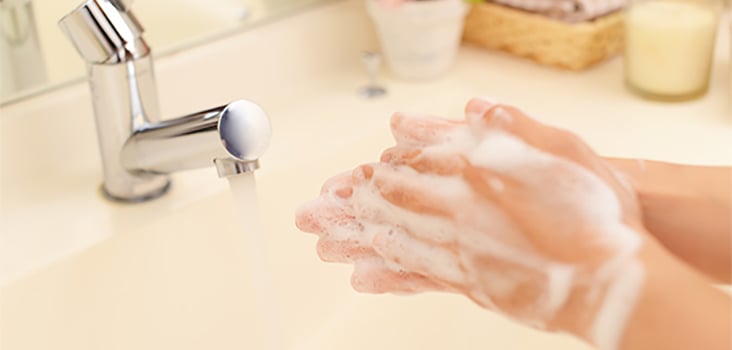
Handwashing Awareness Week: Handwashing Myths Debunked
According to The Centers for Disease Control and Prevention (CDC), handwashing is the most effective way to prevent the transmission of disease. However, people are cutting corners at the sink – not using soap, only washing for 6 seconds, or skipping handwashing entirely.1 If you aren’t washing your hands properly, you could be exposing yourself and those around you to harmful bacteria.
To celebrate Handwashing Awareness Week, Concentra wants to spread the word (not the germs) on how to effectively keep your hands germ-free. Here are some of the top myths about handwashing, and the truth behind them.
Myth: If I use soap, it doesn’t matter how long I wash my hands.
Using soap for any period is good. Washing your hands with soap for 15-20 seconds is even better. The CDC, UNICEF, and most health care professionals say this is (the amount of time it takes to sing “Happy Birthday” twice) the most effective amount of time for bacteria removal.2
When you spend about 20 seconds rubbing soap between your hands, you have enough time to develop a good lather and enough friction to rub away the germs.
Myth: Hand sanitizer is a good replacement for soap and water.
If you exchange the word “replacement” for “supplement,” you have a true statement. Hand sanitizer made with at least 60% alcohol is a great option when soap and water isn’t available, but it doesn’t have the same impact on germ removal. It’s not effective on visibly dirty hands and doesn’t eliminate all types of germs, including norovirus, a highly contagious disease that causes diarrhea and vomiting.3
When soap and water is available, always choose good old fashioned handwashing over hand sanitizer.
Myth: Handwashing with warm water is more effective for germ removal.
Not true! In fact, water temperature doesn’t affect germ removal at all. This myth might have started because we associate hot water with cleanliness, or to keep people washing their hands longer under a more comfortable temperature. Some evidence suggests that warmer water can irritate your skin and affect the protective layer, leaving you more vulnerable to bacterial infection.4
The CDC and the World Health Organization (WHO) don’t have water temperature recommendations. It’s more important to use soap and water, and to lather for 20 seconds. Use whatever water temperature is most comfortable to you.
Myth: Hot air dryers are more hygienic than paper towels.
This debate has been going on for years, and the conclusion is…not really. Research suggests that 10 seconds of drying your hands with a paper towel is as effective as at least 40 seconds with a standard hot air dryer. Most people get impatient and leave while their hands are still damp, which is bad since bacteria passes more easily from a wet surface.
Air dryers are also known to spread bacteria. While the air blowing on your hands is clean, the germy air is spread throughout the bathroom. However, the amount spread may not be enough to get you sick.
Using paper towels also offers a second round of friction to help remove bacteria.
Myth: Antibacterial soap is more effective than regular soap.
There‘s no proof that antibacterial soap is more effective. It’s more of a marketing ploy to provide a false sense of security. Regular soap is just as effective as antibacterial soap in removing bacteria, if you lather for at least 20 seconds. Has that hit home yet?
The only difference is that antibacterial soap contains chemicals, not found in regular soap, meant to reduce and prevent bacterial infection.5 Again, there’s no evidence that these chemicals are effective. We also don’t know how these chemicals affect humans long term, so you might be better off with regular soap. In fact, the over-use of anti-bacterial hand soaps and gels has led to stronger bacteria and drug-resistant germs, leading to the development of super-bugs. Thus, these are being phased out in many markets.
Here are the facts: use soap and water, lather for 20 seconds, and make sure your hands are dry before moving along. Wash your hands regularly to prevent yourself from catching or spreading a preventable disease or illness.
Resources:
[1] "95 percent of people wash their hands improperly: Are you one of them?" CBS News. June 12, 2013.
[2] Global Handwashing Partnership FAQs.
[3] "Healthy Outlook: Hand Sanitizers good weapon in germ warfare, but soap and water still the best bet." Contra Costa Health Services. November 26, 2013.
[4] "Is hot water more effective for hand washing?" deb Blog. March 11, 2014.
[5] "Antibacterial Soap? You Can Skip It, Use Plain Soap and Water." US Food and Drug Administration. May 16, 2019.



